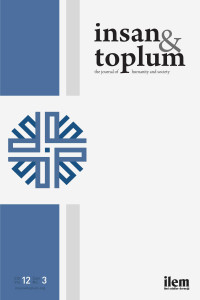LGBT Hareketin Gelişimi, Kurumsallaşması ve Batı Medeniyet Projesine Dönüşümü
Eşcinsel hakları, LGBT aktivizmi, homomilliyetçilik, homokapitalizm
The Development, Institutionalization and Transformation of The LGBT Movement into a Western Civilization Project
LGBT rights, LGBT activism, homonationalism, homocapitalism.,
___
- Avrupa Komisyonu AB Genişleme Politikasına İlişkin 2019 Türkiye Raporu. (2019). https://www.ab.gov.tr/ siteimages/birimler/kpb/2019_trkiye_raporu-_tr.pdf adresinden 6.3.2021 tarihinde erişilmiştir.
- Adam, B. (2020). Political economy, sexuality, and intimacy. M. J. Bosia, M. McEvoy, & M. Rahman (Eds.). In The Oxford handbook of global LGBT and sexual diversity politics. Oxford University Press.
- Agathangelou, A. M. (2013). Queerness as a speculative economy and anti-blackness as terror. International Feminist journal of Politics, 15(4), 453-476.
- Albayrak, H. Ş. (2020). Yeni normalin inşası/icbarı süreci olarak LGBT. Lacivert Dergi. Haziran.
- Ayoub, P., & Paternotte, D. (2020). Europe and LGBT Rights: A Conflicted Relationship. M. J. Bosia, M. McEvoy, & M. Rahman. (Eds.). In The Oxford handbook of global LGBT and sexual diversity politics. Oxford University Press.
- Aylward, E. (2020). Intergovernmental organizations and nongovernmental organizations: The development of an international approach to LGBT ıssues. M. J. Bosia, M. McEvoy, & M. Rahman. (Eds.). In The Oxford handbook of global LGBT and sexual diversity politics. Oxford University Press.
- Bailey, J. M. (2003). The man who would be queen. Joseph Henry Press. BBC News. (2 Nov. 2018). Over 1600 scientists condemn trump transgender proposal. https://www.bbc.com/ news/world-us-canada-46067559 adresinden 25.6.2021 tarihinde erişilmiştir.
- BM İnsan hakları Yüksek Komiserliği. (2012). Herkes özgür ve eşit doğar. https://www.ohchr.org/Documents/ Publications/BornFreeAndEqual_Turkish.pdf adresinden 12.3.2021 tarihinde erişilmiştir.
- Butler, J. (2014). Bela bedenler. C. Çakırlar & Z. Talay (Çev.). Pinhan Yay.
- Carey, B. (2007). Criticism of a gender theory, and a scientist under siege. New York Times. https://www.nytimes. com/2007/08/21/health/psychology/21gender.html adresinden 20.6.2021 tarihinde erişilmiştir.
- Corrales, J. (2020). The expansion of LGBT rights in Latin America and the backlash. M. J. Bosia, M. McEvoy, & M. Rahman. (Eds.). In The Oxford handbook of global LGBT and sexual diversity politics. Oxford U+niversity Press.
- Dreger, A. D. (2008). The controversy surrounding the man who would be queen: A case history of the politics of science, identity, and sex in the internet age. Arch Sex Behav, 37, 366-421.
- Edenborg, E. (2020). Visibility in global queer politics. M. J. Bosia, M. McEvoy, & M. Rahman. (Eds.). In The Oxford handbook of global LGBT and sexual diversity politics. Oxford University Press.
- Foucault, M. (1987). Söylemin düzeni. T. Ilgaz (Çev.). Hil Yay. Foucault, M. (2007). Cinselliğin tarihi. H. U. Tanrıöver (Çev.). Ayrıntı Yay.
- Hardt, M. & Negri, A. (2003). İmparatorluk. A. Yılmaz (Çev.). Ayrıntı Yay.
- Harrison, B. F. ve Michelson, M. R. (2017). Listen, we need to talk, how to change attitudes about LGBT rights. Oxford Uni. Press.
- Keating, S. (2019). Gender dysphoria isn’t a ‘social contagion’, according to a New Study. BuzzFeedNews. https://www.buzzfeednews.com/article/shannonkeating/rapid-onset-gender-dysphoria-flawed-methods- transgender adresinden 25.6.2021 tarihinde erişilmiştir.
- Langlois, A. J. (2020). Making LGBT Rights into human rights. M. J. Bosia, M. McEvoy, & M. Rahman. (Eds.). In The Oxford handbook of global LGBT and sexual diversity politics. Oxford University Press.
- Pembe Hayat. (2011). Transeksüellere yönelik şiddeti durdurun. http://www.pembehayat.org/haberler/detay/ 319/transeksuellere-yonelik-siddeti-durdurun adresinden 6.3.2021 tarihinde erişilmiştir.
- Puar, J. (2007). Terrorist assemblages. Duke University Press. Puar, J. (2013). Rethinking homonationalism. Int. J. Middle East Studies, 45, 336-339.
- ISSN: 2146-7099
- Başlangıç: 2011
- Yayıncı: İlmi Etüdler Derneği
Sınır Sosyolojisi Perspektifinden Theo Angelopoulos’un “Sınır Üçlemesi”
Siyasette Epistemik Kriz ve Tevazu
Rejim İstikrarının İzlek Bağımlı Açıklaması: Mısır’da Kitlesel Ayaklanmalar, Ordu ve Siyasi İktidar
LGBT Hareketin Gelişimi, Kurumsallaşması ve Batı Medeniyet Projesine Dönüşümü
Argümanları, Gücü ve Sınırları ile Uluslararası İlişkilerde Kurumsal Hiyerarşi Teorisi
